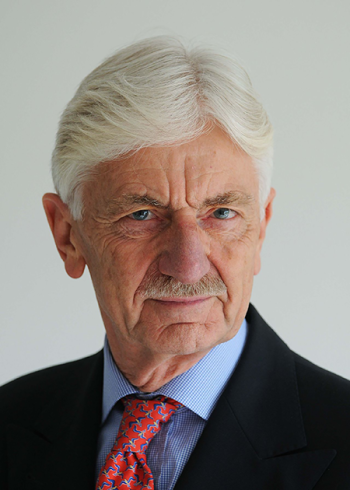"I find hope in the work of long-established groups such as the Arms Control Association...[and] I find hope in younger anti-nuclear activists and the movement around the world to formally ban the bomb."
Jaap Ramaker (1939-2024)
January/February 2025
By Daryl G. Kimball

Jaap Ramaker, an accomplished diplomat for the Netherlands who played a critical role in securing one of the most important nuclear nonproliferation breakthroughs, died on December 12. As chair of a UN committee at the Conference on Disarmament (CD), the soft-spoken but firm Ramaker guided multilateral negotiations on the long-sought Comprehensive Test Ban Treaty (CTBT) to a successful conclusion in the summer of 1996. The treaty was opened for signature later that year.
Today, the CTBT has 187 signatories, including five of the eight countries that possess nuclear weapons. Although it has not yet entered into force, the treaty that Ramaker brought across the negotiating finish line has established a strong global norm against nuclear weapons test explosions.
Ramaker’s distinguished diplomatic career began after he earned a master’s degree in political science from the University of Amsterdam in 1967 and began working for the Ministry of Foreign Affairs the following year. By 1970, he was posted to the Dutch Embassy in Cameroon, then returned to The Hague to work at the Foreign Ministry’s central and southern Africa department until 1975. By 1977, he was serving as consul at the Dutch Embassy in Rio de Janeiro and later was promoted to first secretary and deputy chief of mission at the Dutch Embassy in Lisbon. He served as head of the ministry’s Middle East department in The Hague from 1980 to 1983.
Ramaker’s work in multilateral disarmament and nonproliferation began in 1983 when he was made an adviser and deputy head of the Dutch delegation to the CD in Geneva. Subsequently, he was assigned to New York as his country’s deputy permanent representative to the United Nations.
From 1990 to 1995, Ramaker was deputy head of mission at the Dutch Embassy in Russia and then ambassador to the CD. He was chairman of Main Committee III, on the peaceful use of nuclear energy, of the 1995 nuclear Nonproliferation Treaty review and extension conference in New York. That same year, Ramaker also assumed the chairmanship of the working group on legal and institutional affairs for negotiations on a comprehensive nuclear test ban treaty and was later selected to chair the negotiations on the CTBT through the final and most difficult months of the talks.
As the CTBT negotiations resumed in Geneva in early 1996, India sought changes that would commit declared nuclear-weapon states to a time-bound nuclear disarmament framework. Despite this, Indian diplomats later announced that their government would not sign the treaty under any circumstances. At the same time, China and France were conducting final rounds of nuclear test explosions. New disagreements emerged on verification issues, while some states, particularly the United Kingdom, insisted that all nuclear-capable states had to ratify the CTBT to bring it into effect, a feature of the final treaty text that has slowed its formal entry into force to this day. By the end of June 1996, Ramaker, with help from “friends of the chair,” had resolved most of these issues, and he presented a final CTBT text for member states of the conference to consider.
India and Iran blocked consensus on the treaty text, however, ostensibly due to the failure to include disarmament pledges in the agreement. To overcome the CD’s consensus rule, Australia rallied global support to bring the CTBT directly to the UN General Assembly, which endorsed the treaty 158-3, with five abstentions, opening the way for the CTBT for signature on September 24, 1996.
In 1999, Ramaker became ambassador to Austria and international organizations in Vienna, including the Preparatory Commission for the Comprehensive Nuclear-Test-Ban Treaty Organization, which was established in 1997 to help implement the treaty. In 2003 he was appointed by CTBT member states as special representative to promote the ratification of the treaty for five years. During that time, he visited the capitals of many of the states that had not signed or ratified the treaty to understand their perspectives and to press for their support so that the CTBT can formally enter into force someday.
In a 2005 interview with Arms Control Today, Ramaker said, “It may take a while, but a permanent ban on nuclear weapon test explosions remains of tremendous importance for our efforts to prevent ever more states from acquiring nuclear weapons.” Going forward, he observed that “the CTBT, indeed the entire issue of nuclear weapons tests and nonproliferation, deserves a higher place in the list of priorities” and the treaty’s entry into force requires that it is discussed “at a sufficiently high, if not the highest, political level.”
